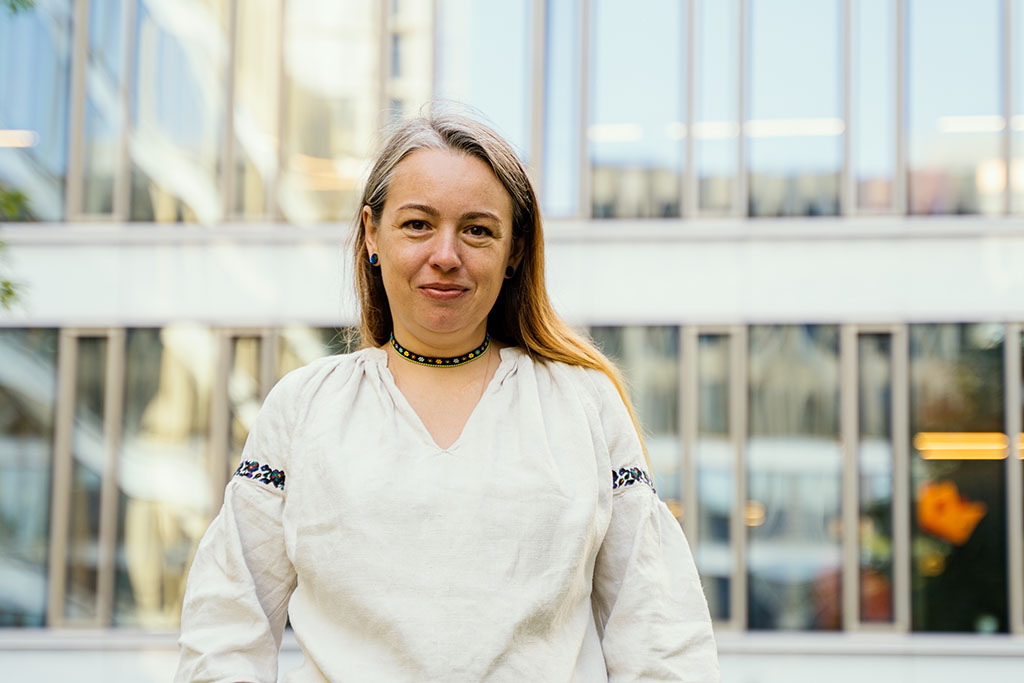Combatting sexual violence stigma in Ukraine
Since 2015, D.O.M.48.24 has supported internally displaced persons in Ukraine, later shifting to focus on preventing gender-based violence. Today, they run a daily crisis center, while combatting the stigma and challenges surrounding sexual and domestic violence.

In 2015, D.O.M.48.24 began working with internally displaced persons in Ivano-Frankivsk in Ukraine, supporting their integration into the local community. After a few years, the organisation identified a need and started working with preventing gender-based violence and promoting gender equality as well.
Today, D.O.M.48.24 is a partner organisation to The Kvinna till Kvinna Foundation and runs a daily crisis center for victims/survivors of domestic violence, internally displaced persons, girls and women where they provide legal counselling, case management and psychological support.
Stigma around sexual violence
In Ukraine, violence towards women is normalized and victim-blaming is very common. The reasons for not reporting sexual violence are many, including not wanting neighbours and family to know as well as receiving bad treatment from the prosecution office or police.
“They [the prosecution office or police] did something very rude to a woman and now, she doesn’t want to register her case. They said ‘okay, I know you were raped, just sign here. Just do not waste my time’,” says Nataliya.
Nataliya and her team work strategically on different levels with this issue. For example, they hold trainings about gender perspective for different authorities. Unfortunately, there are other actors who are contributing to the stigma around sexual violence.
After Russia’s full-scale invasion in February 2022, there has been a great interest from the international community to make sexual violence cases public. However, it can exploit women who have been subjected to sexual violence, not considering the consequences of making it public.
“People are chasing those cases to publicly announce it. They use it because they need some results to show. Unfortunately, it’s very easy to figure out who this woman is, even if you do not mention her name,” says Nataliya.
Increase knowledge about domestic violence
For several years, D.O.M.48.24 did not receive a lot of domestic violence cases. Instead, they focused on raising the knowledge about domestic violence in general.
“It’s very common that they [women subjected to domestic violence] do not come to us because often, they’re not looking for help.”
D.O.M.48.24 organised various workshops, such as drawing, make-up, educational and psychosocial workshops, where women could also receive information about D.O.M.48.24 and their available services. Sometimes, they reach someone directly affected by violence, sometimes someone who knows someone who has been subjected to violence.
“Often, you will tell a friend instead of a family member, organisation or psychologist. And if friends know about us, they can recommend us. We know that it takes time and could be a long process,” says Nataliya.
Last year, the organisation launched a medical checkup initiative supported by Kvinna till Kvinna. D.O.M.48.24 refers a woman to a clinic where she receives a gynaecological check-up. When receiving the referral, they also receive information about domestic violence and available support.
“People disregard their health because they have other problems.”
It also works the other way around—gynaecologists who knows the organisation’s work and see that a woman needs support can refer a woman to D.O.M.48.24.
Flexible funding is essential
It has almost been three years since the full-scale invasion and flexible funding is essential for D.O.M.48.24 to be able to continue their work. They run a daily crisis center for victims/survivors of domestic violence and offer legal counselling, but also support victims/survivors with smaller inquires depending on the needs.
For example, they provided headphones to a family with five children who all had distance learning in one room at the same time with different teachers. It was impossible for the children to learn without the headphones.
“Today, people need headphones, but tomorrow, they will need something else. We always check the needs; they are changing rapidly. You cannot predict those changes during the war.”
This is something they have dealt with since the beginning of the full-scale invasion. Nataliya also gives examples of blackouts and problem after problem succeeding each other. In the end, there is no question that flexible funding is essential, and the impact is clear:
“I can say that every dollar transforms lives.”
Kvinna till Kvinna has supported women’s rights in Ukraine since 2014 through cooperation with local organisations. Read more about our work »